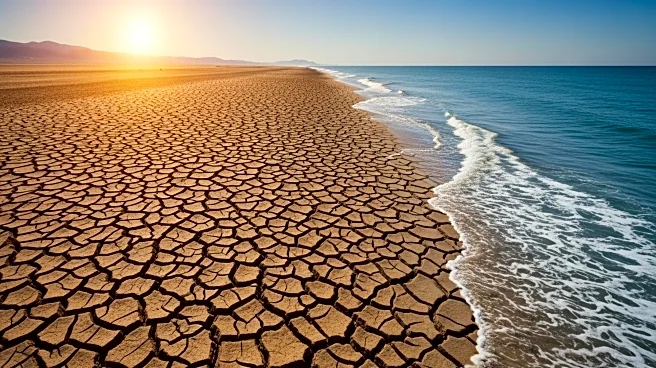What's Happening?
Australia has released a comprehensive climate risk report detailing the severe impacts of global heating on the country. The report includes animated maps illustrating the worsening conditions for heatwaves, drought, and coastal flooding if immediate action is not taken. Researchers at RMIT have developed a Heat Vulnerability Index, which assesses the susceptibility of populations to heat based on factors such as age, disability, and socioeconomic status. Additionally, Monash University researchers have presented new estimates showing higher rates of heatwave-related deaths in lower socioeconomic areas. These findings underscore the urgent need for effective climate policies to mitigate the adverse effects of global warming.
Why It's Important?
The climate risk report is crucial as it highlights the urgent need for Australia to address climate change to prevent catastrophic outcomes. The data suggests that without significant intervention, heatwaves and coastal flooding will increasingly threaten vulnerable populations, particularly in socioeconomically disadvantaged areas. This could lead to increased mortality rates and strain on public health systems. The report serves as a call to action for policymakers to implement robust climate strategies to protect communities and ensure sustainable development. Failure to act could exacerbate social inequalities and economic challenges, impacting Australia's long-term resilience and prosperity.
What's Next?
Australia's government is expected to face pressure to enhance its climate policies and emissions reduction targets. Stakeholders, including environmental groups and public health advocates, may push for more aggressive measures to combat climate change. The release of the Heat Vulnerability Index could lead to targeted interventions in high-risk areas, focusing on infrastructure improvements and community support. As the climate risk report gains attention, it may influence public discourse and drive legislative changes aimed at reducing carbon emissions and promoting renewable energy sources. The international community will likely monitor Australia's response, given its role in global climate efforts.
Beyond the Headlines
The report's findings could have broader implications for Australia's economic and social landscape. As climate risks intensify, industries such as agriculture and tourism may face disruptions, necessitating adaptation strategies. The focus on vulnerable populations highlights ethical considerations in climate policy, emphasizing the need for equitable solutions that prioritize marginalized groups. Long-term, the report could catalyze shifts in public attitudes towards environmental sustainability, fostering a culture of conservation and resilience. The data may also inform global climate negotiations, positioning Australia as a case study in managing climate risks.










